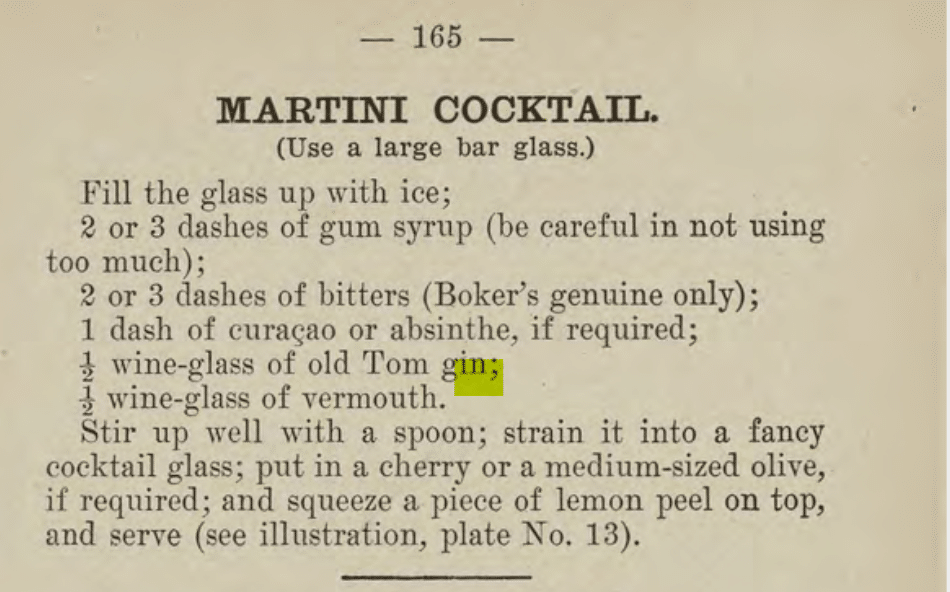Ultimately, it comes down to taste. Your taste. Neither is inherently superior to the other, though they will be different. A gin martini is about the botanicals. A vodka martini is about mouthfeel and the flavor of the Vermouth.
As an author who has focused on gin— I have a bias. I think that gin presents far more complexity and opportunities for the Martini drinker. However, putting that aside, we’ll take a look at the differences between the two and the ways that adjusting the base spirit can change the cocktail.

Firstly, what is a Martini?
A Martini first came into fashion during the late 19th century as a combination of gin and dry vermouth.
While there are variations abound— including some that have no Vermouth— as a cocktail, the Martini is a cocktail consisting of two ingredients. While sipping gin or vodka, chilled and neat can be a delight, a Martini it is not.
The ratio is highly variable. Early Martini recipes tended to be heavier on the Vermouth, using both gin and Vermouth in equal amounts. As the quality of distillates improved, paralleling the rise of dry gin, the ratios adjusted to showcase the spirit a little bit more.
A ratio of 3 parts spirit to 1 part Vermouth is a common baseline, though there are no rules. From as little as a Vermouth rinse, to the 1:2 ratio of the “Reverse Martini,‘ the variations are myriad.
Finally, the topic of garnish often comes up. Olives or a lemon peel twist are traditional; however, variations are abound here as well. The use of a pickled onion turns a Martini into a Gibson. For the sake of this article, I’ll stick to lemons and olives (with no brine added— though dirty and very dirty Martinis are a subject unto themselves and worth their own article).
The GIN is IN’s “Classic Martini”
3 parts spirit
1 part Dry vermouthStir with ice, strain into a chilled cocktail glass. Garnish with a lemon twist.
The Vodka Martini
Whether choosing a vodka or gin Martini, the base spirit is a key decision point.
There are two paths one can choose here. One is to choose the most neutral vodka available and pair it with a sterling Vermouth. Given the prominence of the vodka, I still believe in the following rule: if you wouldn’t sip it on its own, don’t use it in a Martini. If you have a vodka that you take shots of (or the best thing you can say about it is “nice burn”) it’s probably not the right call.
Personally, I like vodkas that are distilled from grains. I especially like ones where there is a hint of flavor from the base distillate. Bear Creek Distillery makes a couple exceptional vodkas. Their Rye has only a slight hint of warm, spicy grain while their Wheat Vodka (my personal go to) has a nice mouthfeel and subtle vanilla kissed winter wheat flavor.
Icelandic Reyka Vodka is sustainably produced, but also affordable and smooth. It’s one of my favorite all-around cocktail vodkas, that just happens to also have a great mouthfeel for a Martini.
As for the Vermouth, I recommend again to choose one that you wouldn’t mind sipping on its own. Freshly opened Dry Vermouth is always best. Store it in the fridge to preserve it (and if you have a dusty bottle in the back of the cabinet— chuck it). It’s best within the first couple weeks or so, but it will last a couple months if properly stored.
While vermouth quality is important in both types of Martinis, it’s absolutely essential in the Vodka Martini. You will be tasting the Vermouth front and center. If it’s off, you’ll taste it.
The Gin Martini
When choosing a gin for a Gin Martini, the primary consideration is the botanical expression. The botanicals are what you’re going to taste, so choose a gin that you like the flavor of on its own. I also tend to choose gins that are lighter in heat, as gins that have a burn or harshness will continue to show it in this expression.
Secondly, the ABV is often a key consideration. While stirring with ice will dilute the spirit a bit, I stay clear of Navy-Strength or other high proof gins (with the exception of perhaps a Reverse Martini).
Another key facet worth considering when making a Martini is the nose. The nose of a gin will still be present and up front; however, chilling has the affect of slowing the volatilization of aromatics. In other words, a chilled Martini will mute the nose. So a gin with a beautiful nose might not show it as intensely in a Martini.
If you’re looking for a classic-style gin Martini with bold juniper my two favorites are Plymouth and Sipsmith.
If you’re a fan of more contemporary styles, I recommend looking for something based on your flavor preference, but I’ll provide a couple of my favorites.
If you like intensely herbal try Marconi 42. If on the more subtle side, try Gin Mare. For a spice forward Martini try Corgi Spirits Very Merry Gin (good even out of season). Tanqueray 10 is a staple for those in search of a slightly citrus-forward Martini gin. Monkey 47’s bold floral/fruity flavor profile seems custom built for a contemporary Martini.
While it will vary, depending on your personal taste— I generally garnish with a twist for all types of gin, except some herbal gins. I find the lemon oil has the affect of brightening and highlighting the botanicals in both the vermouth and gin, especially any citrus botanicals.
Vermouth Tasting Notes
No matter whether choosing a vodka or gin Martini, the choice of Vermouth matters. While there’s dozens out there, here is a brief list of a couple that I think pair well with vodka and gin.
La Quintinye Vermouth Royal Extra Dry Vermouth (Recommended with gin and vodka)— Floral/herbal, with hints of fennel, anise that ease into a complex finish with lemon verbena, mint and wormwood.
Dolin Dry Vermouth (recommended with gin)— Gently sweet, with hints of Bosc Pear and stone fruit early that ease into pine mid-palate. Slightly acidic with restrained wormwood.
Sacred English Dry Vermouth (recommend with vodka)— Dry and clean, with a pronounced, but not bitter wormwood profile. Herbal with a slight fruity lift at the end.
So, will it be a vodka or gin Martini?
Despite being a gin site, I think the most important thing is to find a cocktail that you enjoy. While I prefer gin, I hope that you are able to find a spirit that you like.

I’ll drink my martini and leave the kangaroo to you.
[…] https://theginisin.com/articles/what-is-better-vodka-or-gin-martini/ […]
Maybe I’m a dinosaur, but I was brought up to believe that a Martini was made with gin. If you prefer vodka, be my guest, but that is a different cocktail, a Vodka Martini. I know this may seem hair-splitting to some, but the devil is in the details. I’ve gotten into many arguments with ignorant bartenders over this when I order a Martini and they ask if I want gin or vodka. My response is usually, “If I wanted a Vodka Martini, that’s what I would have ordered.” That usually starts an argument. I should also note that I live in Wisconsin, where the state cocktail is the BrandyOldFashionedSweet (all one word), so we know how to properly order our drinks!